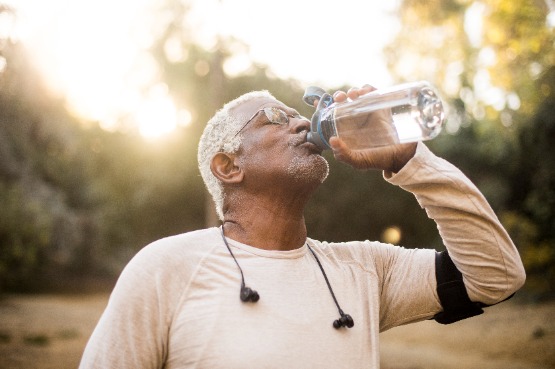Food for energy: before, during, and after exercise
How you eat and drink can really affect how well you can exercise. This is true whether you are jogging in the park or doing a marathon. But with sports nutrition, timing is key. Here, I’ll outline the best strategy when eating for energy before, during, or after exercise.

The basics of a healthy diet also apply to sports nutrition. This means it’s important to eat a balanced diet made up of wholegrains, healthy fats, and lean proteins. It’s also essential to get a wide range of brightly coloured vegetables and fruits. This is good for both your general health and your immune function.
Below are specific considerations when eating or drinking before, during, and after exercise.
What to eat before exercise
Before you start exercising its good to prepare your body with the fuel it needs. Carbohydrates provide you with glucose – your body’s main energy source. Having carbohydrates before exercise can also increase your glycogen stores. This means any excess glucose is stored in your muscles and liver, ready to be used during exercise.
Including some protein in your pre-exercise snack is also useful. This is because it can aid your muscle recovery once you have finished exercising. Ideally you want to keep your fat and fibre intake low before exercise. Foods with high fat and fibre are harder to digest which can cause discomfort when you are active.
Eating around 30 minutes to an hour before exercising is ideal. This is because it will give you a good source of fuel, whilst also giving you time to digest.
A few ideas for pre work out snacks include:
- a fruit smoothie with low fat milk
- oatcakes with cottage cheese
- rice cakes with chopped bananas
Pre-exercise hydration
Aiming to be hydrated before you start exercising is a good idea. This is because it will help your body to perform better. It will also mean you don’t need to drink huge amounts during exercise, which can also cause digestive issues. Make sure to drink steadily during the hours before you exercise rather than drinking a lot just before you start.
Water, fruit juice, teas and coffees all count towards your hydration needs. There is also some evidence that having a small amount of caffeine before exercise can improve your performance.
What to eat during exercise
For exercise lasting an hour or less, you don’t need to eat anything during exercise. This is because you should have enough stored glycogen to keep you going. Especially if you have a snack containing carbohydrates before you start.
But, if you are exercising for more time, such as during a mountain climb, long bike ride or run you’ll need to replenish your energy stores. You could have banana or another carbohydrate-based snack. You could also consider having a glucose gel or drink on the go.
Hydration during exercise
Even if you are well hydrated before you exercise, it’s important not to get dehydrated during your work out. If you work out for an hour or less drinking water little and often is sufficient. But if you’re doing moderate or vigorous exercise for over an hour an isotonic drink can help. This is because when you exercise more intensely you can become depleted in electrolytes through your sweat. Making your own isotonic drink at home can be a lower sugar option to shop bought varieties.
What to eat after exercise
Recovering well from exercise is important. To help your muscles repair you’ll need to include a good source of protein with your meal or snack. If you’re not planning to have your main meal within 30 minutes of finishing your exercise, then consider having a snack to replenish your stores. Adding in some carbohydrates is also useful as this will help you to restore your glycogen supplies.
Good examples of post exercise snacks are:
- a handful of mixed nuts and dried fruit
- a Greek yoghurt with a handful of oats and some berries
- some peanut butter on rice cakes
Post-exercise hydration
Even though you’ve finished exercising it’s a good idea to replenish any lost fluids. But sticking to your normal drinking and eating routines should mean you start to rehydrate over time. There’s no need to drink excessive amounts of water after exercise, and this can also be dangerous to your health.
Protein supplements
Despite the popularity of protein shakes and supplements, they are unnecessary for most people. They can be useful if you’re extremely active, or don’t feel like eating solid food after working out. But if you’re moderately active, you can still get enough protein from your diet. Having protein shakes when you don’t need them can also lead to weight gain.
In order to top up your protein levels after exercise and increase your hydration, you could try making a smoothie made from low fat milk. Milk contains a special protein called casein which can help your muscles to repair and grow, especially if you have it before sleep.
Do you know how healthy you truly are? Bupa health assessments give you a clear overview of your health and a view of any future health risks. You'll receive a personal lifestyle action plan with health goals to reach for a happier, healthier you.
-
Sources Sources
- Sport and exercise. British Dietetic association. https://www.bda.uk.com/, updated May 2020.
- Nutrition and immunity – be careful of myths and false promises. www.nutrition.org.uk, reviewed March 2020.
- Nutrition for sports and exercise. British Nutrition foundation. www.nutrition.org.uk, reviewed April 2020.
- Thomas T Erdman Ka Burke Lm. Joint position statement: Nutrition and athletic performance. Academy of nutrition and dietetics, dietitians of canada, and the american college of sports medicine. Medicine & Science in Sports & Exercise 2016; 48(3):543-68. doi: 10.1249/MSS.0000000000000852.
- Timing your pre- and post-workout nutrition. Academy of Nutrition and Dietetics. www.eatright.org, Published 10 September 2019.
- The importance of hydration. www.bda.uk.com, updated 19 August 2019.The importance of hydration | British Dietetic Association (BDA).
- Guest N, VanDusseldorp T, Nelson M et al. International society of sports nutrition position stand: caffeine and exercise performance. Journal of the International Society of Sports Nutrition 2021;18: 1. Sports nutrition.
- American Academy of Orthopaedic Surgeons. www.orthoinfo.aaos.org, last reviewed August 2019.
- Babault N, Deley G, Ruyet P et al. Effects of soluble milk protein or casein supplementation on muscle fatigue following resistance training program: a randomised, double-blind, and placebo-controlled study. Journal of the international society of sports. Journal of the international society of Sports Nutrition 2014;36.
About our health information
At Bupa we produce a wealth of free health information for you and your family. This is because we believe that trustworthy information is essential in helping you make better decisions about your health and wellbeing.
Our information has been awarded the PIF TICK for trustworthy health information. It also follows the principles of the The Information Standard.

More diet and nutrition articles
Did you find our advice helpful?
We’d love to hear what you think. Our short survey takes just a few minutes to complete and helps us to keep improving our healthy lifestyle articles.
Legal disclaimer
This information was published by Bupa's Health Content Team and is based on reputable sources of medical evidence. It has been reviewed by appropriate medical or clinical professionals and deemed accurate on the date of review. Photos are only for illustrative purposes and do not reflect every presentation of a condition.
Any information about a treatment or procedure is generic, and does not necessarily describe that treatment or procedure as delivered by Bupa or its associated providers.
The information contained on this page and in any third party websites referred to on this page is not intended nor implied to be a substitute for professional medical advice nor is it intended to be for medical diagnosis or treatment. Third party websites are not owned or controlled by Bupa and any individual may be able to access and post messages on them. Bupa is not responsible for the content or availability of these third party websites. We do not accept advertising on this page.









